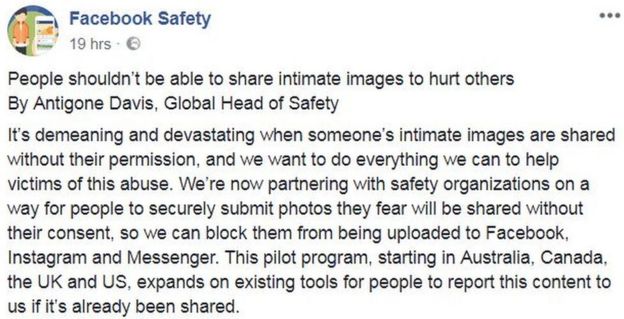Facebook is asking British users to send naked photos of themselves to the social network, to try to stop revenge porn.
If you're worried an intimate photo of you could be shared by someone else, the idea is to get it blocked before it appears online.
Similar technology is used to try to stop the spread of child abuse images.
Facebook's been testing the system in Australia and is extending the trial to the UK, the USA and Canada.
A spokesman told Newsbeat the idea is open to people in the UK now.
Facebook hasn't revealed any details about how the trial in Australia went - but obviously, the idea requires a huge leap of faith.
Would you send sexually explicit photos of yourself to Facebook?
Could you be certain the image would be handled sensitively - and crucially, not shared?
How it works
If there's an image you're worried about, Facebook says you should contact its partner for the trial. In the UK, it's the Revenge Porn Helpline.
Staff there will then get in touch with Facebook and you'll get sent a link to upload the photo.
Who will see my naked photo?
Facebook's Global Head of Safety Antigone Davis told Newsbeat that photos will only be seen by "a very small group of about five specially trained reviewers".
They'll give the photo a unique digital fingerprint - something called hashing.
That code will then be stored on a database. If anyone else tries to upload the same photo, the code will be recognised and it'll be blocked before it appears on Facebook, Instagram and Messenger.
The original photos will not be stored.

Will the idea definitely work?
Antigone Davis admits there's "no 100% guarantee when it comes to photo-matching technologies".
That's because it's possible to manipulate images so they're different to the original. But she says they are getting better at it.
This whole system only works if you actually have the image you're worried about.
If, for example, your ex took a load of photos on their phone and you don't have them, this idea doesn't help.
The UK's Revenge Porn Helpline has seen huge year-on-year increases in reported incidents since it was launched in 2015.
The hotline received just over 500 reports in 2015 and more than 1,000 in 2017.
Latest Stories
-
I didn’t speak against holding wrongdoers accountable – Rev. Kwadwo Bempah clarifies ORAL comment
49 minutes -
RSS Developers to hold 3-day open house event on home purchasing from Friday, Dec. 27
1 hour -
Elikem Treveh: How TEIN UMaT students contributed significantly to NDC’s victory in Tarkwa Nsuaem constituency
1 hour -
Joy FM Family Party in the Park kicks off with excitement at Aburi Botanical Gardens
2 hours -
JP U-15 Cup 2024: Fadama Ajax wins maiden edition
2 hours -
Lured for Love, Caged for Cash: How an 80-year-old American seeking love was kidnapped in Ghana by a Nigerian gang
3 hours -
Star Oil Ltd @ 25: Driving Growth and Profitability with a Vision for Renewable Energy and a Sustainable Future
4 hours -
American Airlines resumes flights after technical issue
4 hours -
NDC Greater Accra Chairman dismisses unauthorised appointment nomination request
5 hours -
Man City might miss out on Champions League – Guardiola
5 hours -
Joy FM’s Party in the Park set to thrill at Aburi Botanical Gardens today
5 hours -
KiDi performs with childhood idol, Kojo Antwi at ‘Likor On The Beach’
5 hours -
South Korea MPs file motion to impeach acting president
6 hours -
Star Oil Ltd @ 25: Driving growth and profitability with a vision for renewable energy and a sustainable future
6 hours -
Bald eagle officially declared US national bird after 250 years
6 hours

